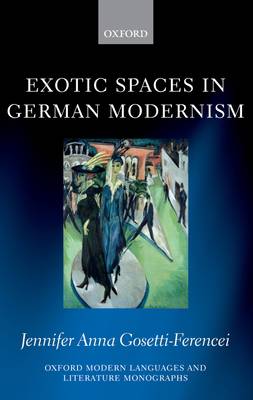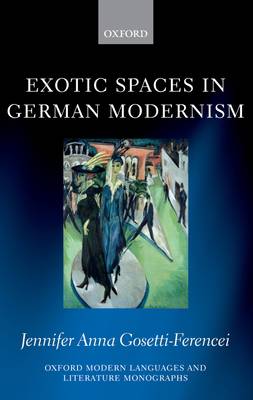
Door een staking bij bpost kan je online bestelling op dit moment iets langer onderweg zijn dan voorzien. Dringend iets nodig? Onze winkels ontvangen jou met open armen!
- Afhalen na 1 uur in een winkel met voorraad
- Gratis thuislevering in België vanaf € 30
- Ruim aanbod met 7 miljoen producten
Door een staking bij bpost kan je online bestelling op dit moment iets langer onderweg zijn dan voorzien. Dringend iets nodig? Onze winkels ontvangen jou met open armen!
- Afhalen na 1 uur in een winkel met voorraad
- Gratis thuislevering in België vanaf € 30
- Ruim aanbod met 7 miljoen producten
Zoeken
Omschrijving
Jennifer Anna Gosetti-Ferencei demonstrates that the exotic, as reflected in major works of German literature and in the philosophy and art that inspires it, provokes central questions about the modern self and the spaces it inhabits. Exotic spaces in the writings of such authors as Thomas Mann, Franz Kafka, Stefan Zweig, Robert Musil, Hugo von Hofmannsthal, Gottfried Benn, and Bertold Brecht, along with the thought of Nietzsche, Freud, Levi-Strauss, and Simmel and the art of German Expressionism, are shown to present alternatives to the landscape and experience of modernity. In an examination of the concept of the exotic and of spatial experience in their cultural, subjective, and philosophical contingencies, Gosetti-Ferencei shows that exotic spaces may contest and reconfigure the relationship between the familiar and the foreign, the self and the other. Exotic spaces may serve not only to affirm the subject in a symbolic conquering of territory, as emphasized in
post-colonial interpretations, or project the fantasy of escapism to a lost paradise, as utopian readings suggest, but condition moral, aesthetic, or imaginative transformation. Such transformation, while risking disaster or dissolution of the self as well as endangerment of the other, may promote new possibilities of perceiving or being, and reconfigure the boundaries of a familiar world. As exotic spaces are conceived as mystical, liberating, erotic, infectious, frightening or mysterious, several possibilities for transformation emerge in their exposure: re-enchantment through epiphany; the collapse of the rational self; liberation of the imagination from the confines of the familiar world; and aesthetic transformation, revealing the paradoxically 'primitive' nature of modern experience. In strikingly original readings of canonical authors and compelling rediscoveries of forgotten ones, this study establishes that exotic experience can evidence the fragility of the European or
Germanic self as depicted in modernist literature, revealing the usually unconsidered boundaries of the subject's own familiar world.
post-colonial interpretations, or project the fantasy of escapism to a lost paradise, as utopian readings suggest, but condition moral, aesthetic, or imaginative transformation. Such transformation, while risking disaster or dissolution of the self as well as endangerment of the other, may promote new possibilities of perceiving or being, and reconfigure the boundaries of a familiar world. As exotic spaces are conceived as mystical, liberating, erotic, infectious, frightening or mysterious, several possibilities for transformation emerge in their exposure: re-enchantment through epiphany; the collapse of the rational self; liberation of the imagination from the confines of the familiar world; and aesthetic transformation, revealing the paradoxically 'primitive' nature of modern experience. In strikingly original readings of canonical authors and compelling rediscoveries of forgotten ones, this study establishes that exotic experience can evidence the fragility of the European or
Germanic self as depicted in modernist literature, revealing the usually unconsidered boundaries of the subject's own familiar world.
Specificaties
Betrokkenen
- Auteur(s):
- Uitgeverij:
Inhoud
- Aantal bladzijden:
- 288
- Taal:
- Engels
- Reeks:
Eigenschappen
- Productcode (EAN):
- 9780199604128
- Verschijningsdatum:
- 15/11/2011
- Uitvoering:
- Hardcover
- Formaat:
- Genaaid
- Afmetingen:
- 218 mm x 145 mm
- Gewicht:
- 501 g

Alleen bij Standaard Boekhandel
+ 412 punten op je klantenkaart van Standaard Boekhandel
Beoordelingen
We publiceren alleen reviews die voldoen aan de voorwaarden voor reviews. Bekijk onze voorwaarden voor reviews.











